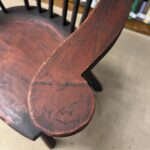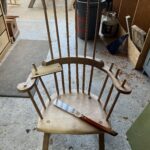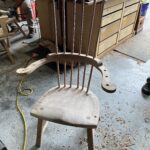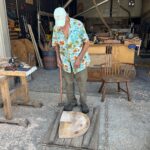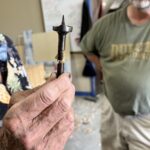“A Summer Journey;
Following the Apostle Paul Through His Missionary Journeys”
A Sermon Series
“Introductions to the Unknown God”
Acts 17:22-34
Introduction
On Paul’s second missionary journey we follow him into the city of Athens. Escaping from Thessalonica and Berea, he is awaiting his fellow missionaries (Timothy and Silas). He is making his way through the city.
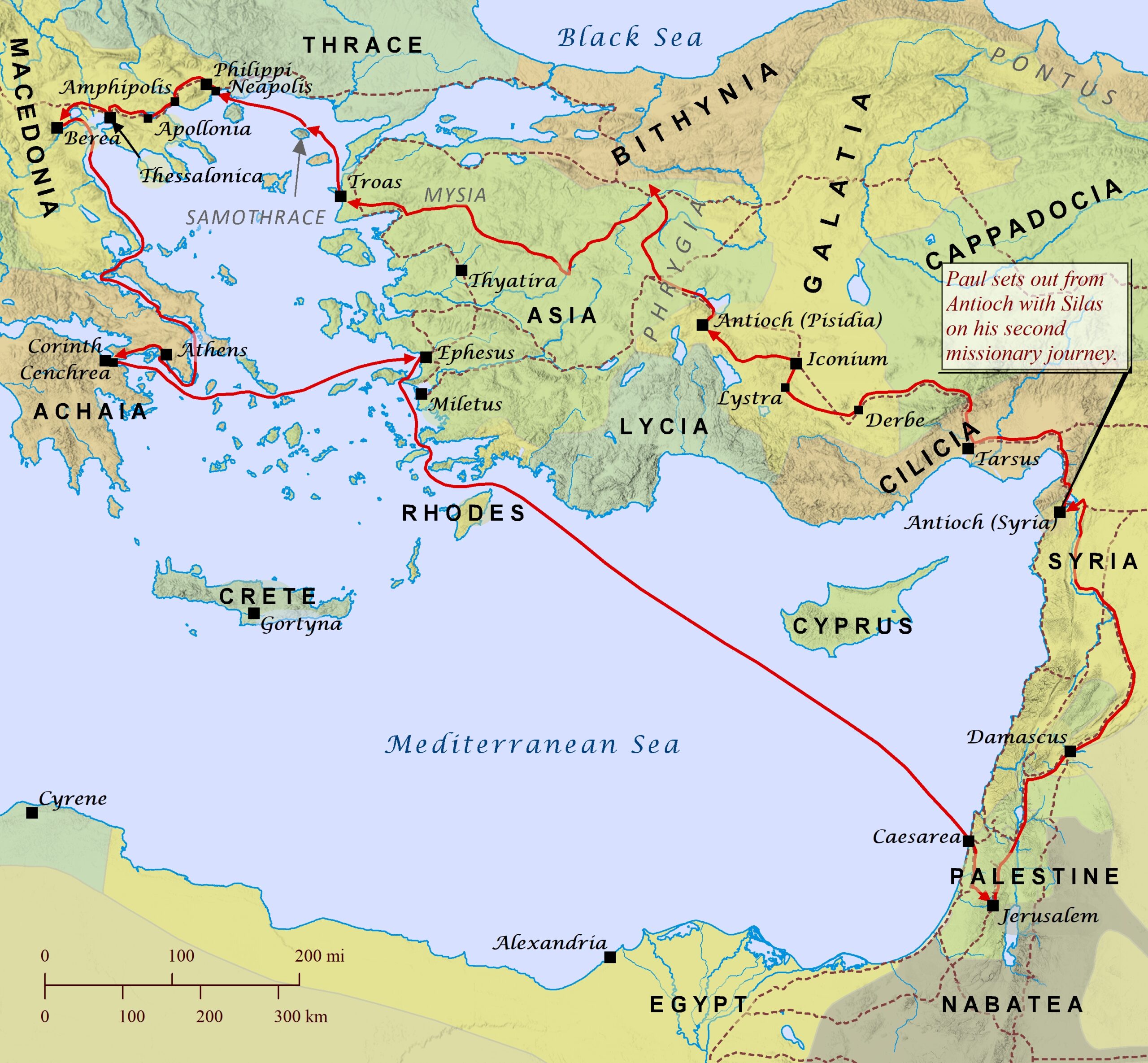
“As a Hellenized Jew, Paul had been exposed to Greek culture with its outstanding traditions in art and philosophy. Athens was the center of that culture. In its heyday, several centuries before Christ, it had been the greatest city in the world. Socrates, his brilliant student Plato, and Plato’s student Aristotle, perhaps the greatest philosopher of all time, taught there.”[1]
Along with this rich academic culture, Athens was also a religious center, where almost every god thought to exist was worshipped. A pagan writer named Petronius sarcastically said that it was easier to find a god in Athens than a man. Every public building was dedicated to god, and statues of gods were everywhere. So, while Paul is waiting, he begins to go into the Jewish synagogues and explaining how Jesus was the Messiah. The Jewish people, in their jealousy, bring Paul before the Roman authorities there in Athens, and there the Roman leaders ask him what he is teaching,
Acts 17:19-21 “And they took him and brought him to the Areopagus, saying, “May we know what this new teaching is that you are presenting? 20 For you bring some strange things to our ears. We wish to know therefore what these things mean.” 21 Now all the Athenians and the foreigners who lived there would spend their time in nothing except telling or hearing something new.”
Understanding That God Is (vv. 22-26)
22 So Paul, standing in the midst of the Areopagus, said: “Men of Athens, I perceive that in every way you are very religious.[2] 23 For as I passed along and observed the objects of your worship, I found also an altar with this inscription: ‘To the unknown god.’ What therefore you worship as unknown, this I proclaim to you.
Hebrews 11:6 “And without faith it is impossible to please him, for whoever would draw near to God must believe that he exists and that he rewards those who seek him.” The Bible intent is not prove that God exists, there also is no scientific experiment or mathematical equations you can do to prove God exists – however it does say things like:
Psalm 19:1 “The heavens declare the glory of God, and the sky above proclaims his handiwork. 2 Day to day pours out speech, and night to night reveals knowledge.”
Romans 1:19-20 “For what can be known about God is plain to them, because God has shown it to them. 20 For his invisible attributes, namely, his eternal power and divine nature, have been clearly perceived, ever since the creation of the world, in the things that have been made.”[3]
Theologians call this the cosmological argument (cause and effect) – everything comes from something (a cause), and if you go back far enough there is an original cause (God as creator). Hebrews 3:4 “For every house is built by someone, but the builder of all things is God.”[4]
https://www.youtube.com/watch?v=ilgdFvit49Y
Paul points out one of their alters, “with this inscription: ‘To the unknown god.’” “Their thinking was that if the gods were nor properly venerated they would strike the city. Hence, lest they inadvertently invoke the wrath of some god in their ignorance of him or her, the city set up these alters to unknown gods (Diogenes 1.110-113).”[5] Paul then says, “You don’t know this God, but I do, and I would like to tell you about this God.
By saying, “What therefore you worship as unknown, this I proclaim to you,” Paul is not saying that God accepted this worship; the emphasis is on the ignorance, not the worship.[6] “You have been worshipping a god that you do not know” – There has to be a knowledge of God, a personal relationship with Him before our worship can ever be accepted by God. That knowledge of God comes through our relationship with Jesus Christ.
Later on, there will people who see Paul’s miracles and try to do the things they saw Paul doing, but it is separate from a relationship with God. They try to use the name of Jesus apart from a relationship with Jesus – Acts 19:13-16 “Then some of the itinerant Jewish exorcists undertook to invoke the name of the Lord Jesus over those who had evil spirits, saying, “I adjure you by the Jesus whom Paul proclaims.” 14 Seven sons of a Jewish high priest named Sceva were doing this. 15 But the evil spirit answered them, “Jesus I know, and Paul I recognize, but who are you?” 16 And the man in whom was the evil spirit leaped on them, mastered all of them and overpowered them, so that they fled out of that house naked and wounded.”
Even the demons knew that they were not followers of Jesus. The Athenians admit they don’t know this god, it’s in the title “unknown god,” built the alter to the unknown god because they did not want this God’s fury – but it is their lack of knowing Him, that will in the end bring judgement upon them.
Understanding God begins with a belief that a God exists, but then we have to ask “What is He like?” It is the tendency of all of humanity, that once we believe there is a God, to then make him into our own image – We think to ourselves, god is like me. So we mold him and craft him to be what we want him to be like – we call this idolatry. So, Paul then goes on to explain what God is like:
24 The God who made the world and everything in it, being Lord of heaven and earth, does not live in temples made by man, 25 nor is he served by human hands, as though he needed anything, since he himself gives to all mankind life and breath and everything. 26 And he made from one man every nation of mankind to live on all the face of the earth, having determined allotted periods and the boundaries of their dwelling place,
The God that Paul is talking about created everything that exists (including the heaven and the earth). He is all powerful and does not need anything (He is completely self-sufficient). We need God to give us breath and life, and it was God who gave us our original source of being (Adam). Our lives of breath have also been allotted out and measured by this unknown God – He determines when you are born, where you are born, to whom you are born, and how many breaths you will take on this earth.
A source of pride by the Athenians was that they were above everyone, and everyone else were barbarians. “All men are equal, because all were created by God.”[7] “The unity of the human race as descended from Adam is fundamental in Paul theology, (Rom. 5:12).”[8] We are equal before God, and we are equal in that we are all sinners.
What is this unknown God like? He creates, he sustains His creation, He is all powerful, He is gives purpose (allotted times, boundaries, dwelling places, etc.) You were born into this world for “such a time as this,” you are given boundaries and purpose. God gives you life and breath “and everything” for a purpose, and your time here is measured. You are not to make your own path, you are not your own creation – Your Creator has intentionally put a path before you. When you meet this unknown God, you discover your life’s purpose.
Understanding Who Go Is (vv. 27-29)
27 that they should seek God, and perhaps feel their way toward him and find him. Yet he is actually not far from each one of us, 28 for “‘In him we live and move and have our being’; as even some of your own poets have said, “‘For we are indeed his offspring.’ 29 Being then God’s offspring, we ought not to think that the divine being is like gold or silver or stone, an image formed by the art and imagination of man.
Our life’s purpose is to have a relationship with God. (v. 27) “that they should seek God, and perhaps feel their way toward him and find him,” This is a picture of “the blind groping of the darkened heathen mind after God to “find him” whom they had lost. One knows what it is in a darkened room to fell along the walls for the door.”[9] Each of the 30,000 statues of gods, and hundreds of temples to gods, all here man’s attempt to find god. But God is not far off from any person, “he is actually not far from each one of us.”
Realizing, through natural revelation, that there is a God, and this God has reached out to humanity and desires to have a relationship with them. Even the Athenian poets recognized this truth, “For we are indeed his offspring.”
(v. 28) Paul quotes a saying of their day, “In him we live and move and have our being’” – In a godless society people are taught that the beginning of time was meaningless (just a cosmic chaos of elements swirling into something existing), and that time ends in eternal nothingness (elements decaying into the earth).
According to the godless world view, we start and end in meaninglessness. What Paul is telling the world is that life is rooted and grounded in God.[10] You live because of God, your path is laid out before you because of God, and your very being (existence) is because of God – and that all-powerful God wants a relationship with you.
Without the light of Jesus, humanity groped along in spiritual darkness and came up with all kinds of false gods – but now that Jesus has arrived, He is the light of the world – Jesus allows us to see who God truly is, what God is like, and how to have a relationship with Him.
Understanding What God Has Said (vv. 30-31)
30 The times of ignorance God overlooked, but know he commands all people everywhere to repent, 31 because he has fixed a day on which he will judge the world in righteousness by a man whom he has appointed; and of this he has given assurance to all by raising him from the dead.”
If a person observes nature around him and comes to the understanding that there is a creator God (a first cause). This is not enough to lead to a saving knowledge of God. God has to reveal himself to the world – and He has done this through Jesus Christ. When Jesus came, it marked a change in how God deals with mankind. Based on the revelation of Jesus to humanity, we must repent of our sin and put our faith in Him.
John 5:22, 27 “For the Father judges no one, but has given all judgment to the Son, 23 that all may honor the Son, just as they honor the Father. . . 27 And he has given him authority to execute judgment, because he is the Son of Man.”
“Something changed dramatically in the course of human history, something that is not just for the Jews but for Athenians, Romans, and Philippians and every person in the world. Now God commands all men everywhere to repent.”[11]
Why the change now that Jesus has been revealed? “because he has fixed a day on which he will judge the world.” – Judgement Day is approaching. To prove that Jesus is the one who will ultimately judge the world based on God’s standard of righteousness, Jesus was raised from the dead.
The knowledge that is revealed through creation, then further explained through the revelation of Jesus, requires a decision – there is always a call to do something with Jesus. What you do with Jesus ultimately determines where we will live, where we move, and where we will have our being.
Understanding That All Have a Decision to Make (vv. 32-34)
32 Now when they heard of the resurrection of the dead, some mocked. But others said, “We will hear you again about this.” 33 So Paul went out from their midst. 34 But some men joined him and believed, among whom also were Dionysius the Areopagite and a woman named Damaris and others with them.
Paul standing amongst all the temples and statues and buildings dedicated to false gods, says, “there is but one God, He has sent His Son to save the world from their sins, and He will return on an appointed day to judge the world based on His standard of righteousness. Do you want to know him?”
When Paul had finished his sermon, there were three responses. One group was fine with novel and new thought, but when it arrived at the resurrection from the dead, they mocked. The second group said. “We will hear you again about this.”. That’s enough truth for one day.” Which is the person who hears the sermon but doesn’t do anything with it. And there were some who believed and even joined them in the missionary journey. They now know the unknown God. Would you like to meet Him today?
___________________
[1] John MacArthur, Macarthur New Testament Commentary Series, Acts (Chicago, Illinois; Moody Publishers, 1996) 129.
[2] Capitatio benevolentiae – a rhetorical technique used in an effort to win the favor of his hearers and thus secure their attention at the beginning of a speech.
[3] Sensus divinatatus – within every person is a knowledge that there is a God (while we may try to suppress it).
[4] This is called the teleological argument; the order and complexity of the universe could not have arisen out of random chance. The house has to have a builder.
[5] Ajith Fernando, The NIV Application Commentary, Acts (Grand Rapids, Michigan; Zondervan Publishing, 1998) 475.
[6] Fernando, 480.
[7] MacArthur, 140.
[8] F. F. Bruce, The Acts of the Apostles, The Greek Text With Introduction and Commentary (Grand Rapids, Michigan; WM. B. Eerdmans Publishing Company, 1979) 337.
[9] Archibald Thomas Robertson, Word Pictures In The New Testament, Volume III (Nashville, Tennessee; Broadman Press, 1930) 288.
[10] R.C. Sproul, Acts, An Expositional Commentary (Sanford, Florida; Ligonier Ministries, 2019) 279.
[11] Sproul, 281.



